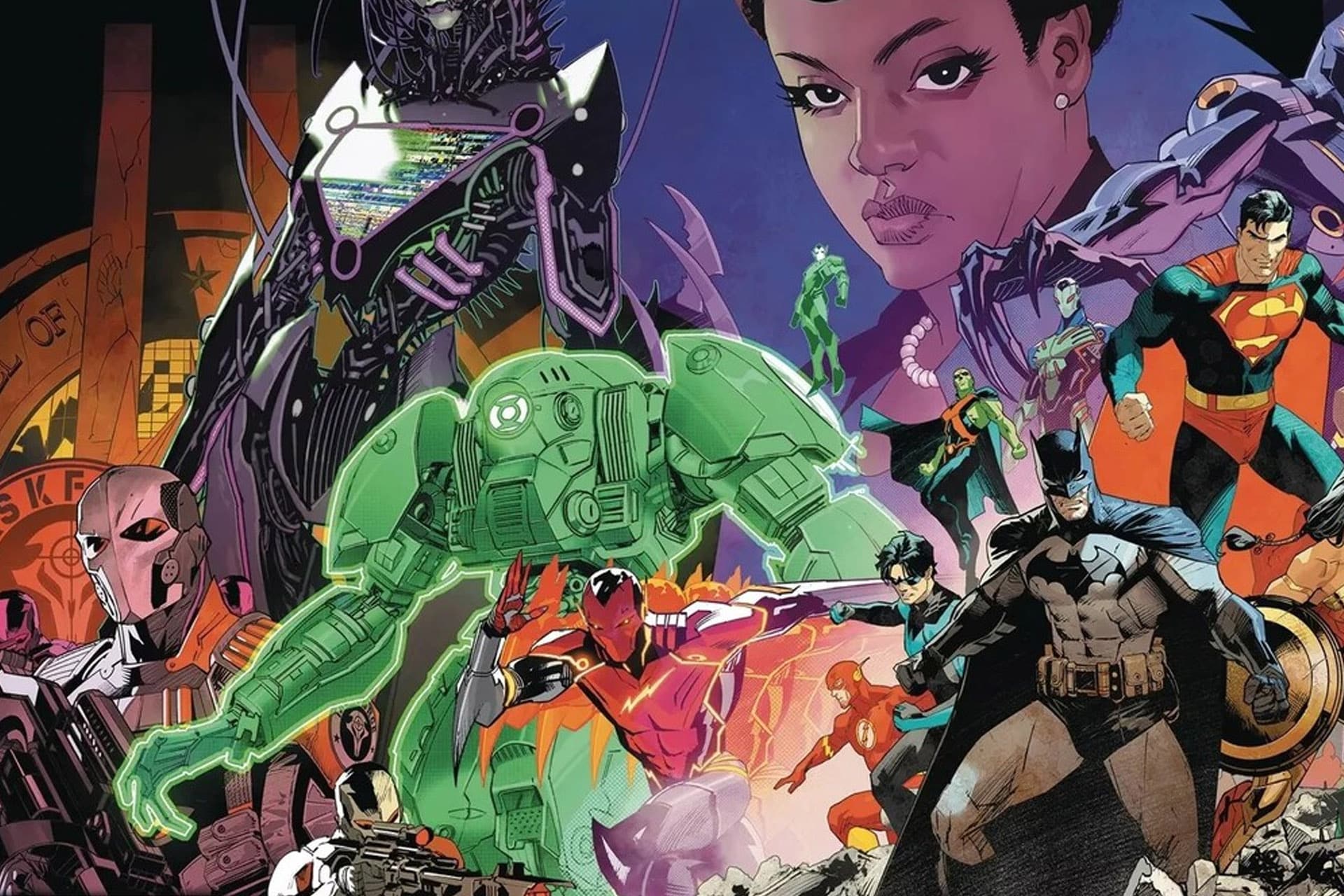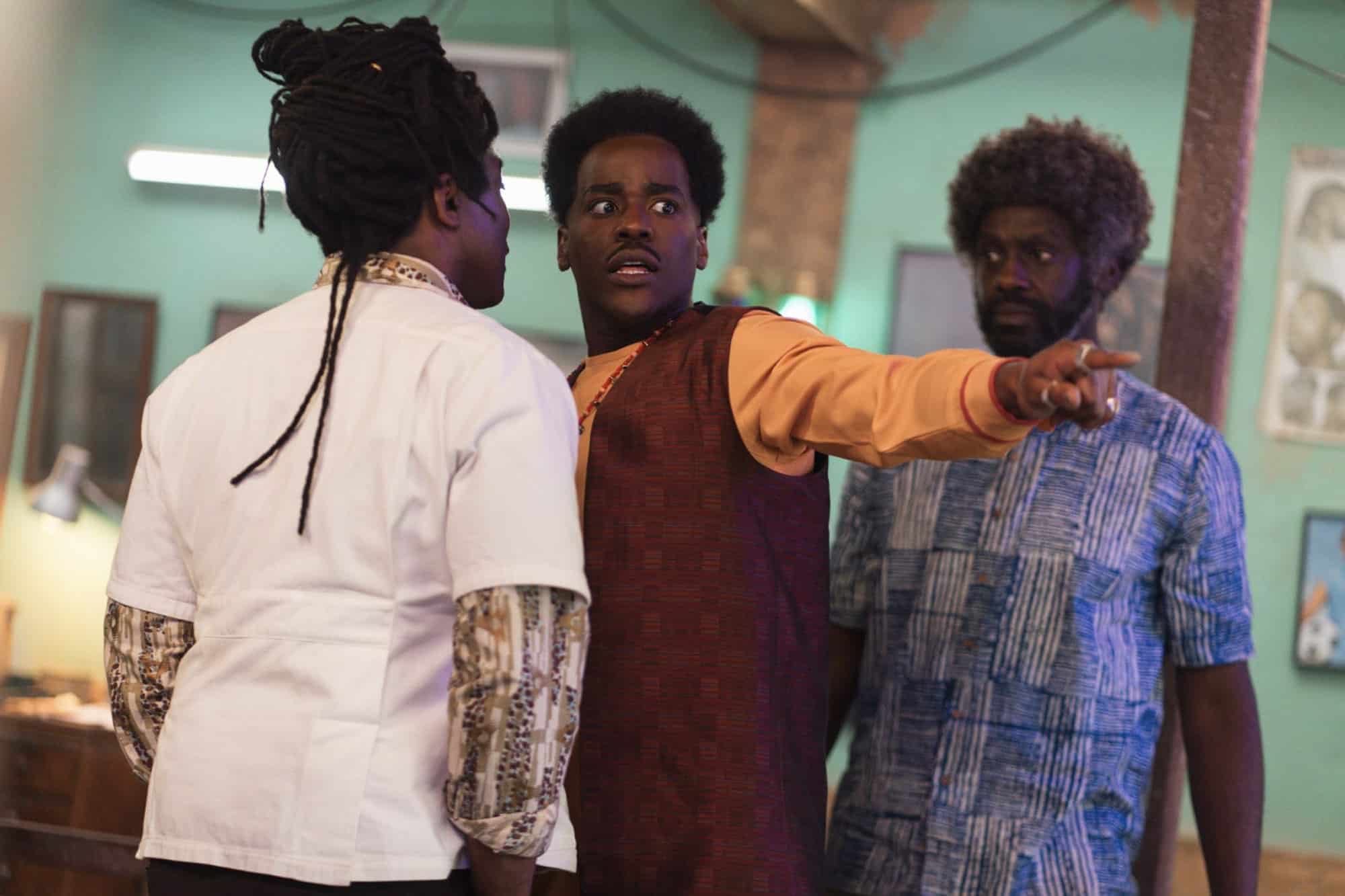- Series: 10
- Episode: Four
- Duration: 50 minutes
- Writer: Mike Bartlett
- Director: Bill Anderson
“Knock on Wood, do what I can”
Knock Knock scorches the return of the haunted house tale to Doctor Who, setting itself in a grand tradition that’s hit some mighty highs over the show’s near five and a half decades.
But if the Doctor’s forays into ‘haunted houses’ have taught us anything, from Day of the Daleks to Image of the Fendahl, Ghost Light to Hide, there’s seldom anything as terrestrially supernatural as a ghost at the centre of the tale. So it is in Bill’s home town of, presumably, Bristol, when she decides that her life away from the Doctor is best spent moving into a large, old house with (mostly) strangers. Yes, Bill no longer needs introducing, she needs moving. And coming in the fourth slot of a so far immensely successful run of stories, a return to the present day brings another pressure to bear on Knock Knock.
Before we get onto the episode’s new shoots and dry rot, it’s worth setting the bar for this review…
The new dynamic
With the New Series of Doctor Who came a great many modern innovations. While many a Classic Series plot and resolution relied on an explosion, a punch or last-minute dash, they were at least present and correct. Most of the worry in those first 26 years came with actors’ holidays or filler that padded out or necessitated deviation in multi-episode adventures. The New Series has reversed that problem. In the straitened run-time of the New Series, there’s little room for filler, even less demand for it. But while the show enjoys more popularity than ever in the short format, those compact stories put far more emphasis on heightened plots that need an ever greater level of satisfaction in their resolution.
While Classic serials swerved between genres, particularly during the show’s mid-1970s prime, that lurch has also been heightened in the new format’s sub-hour chunks. And crossing the gamut of emotion, humour and fear that’s central to Who, it means the audience has naturally split in return. Sublime emotion, break-neck action, or atmospheric setting can boost its success for one fan, diminish it for another. As showrunner Steven Moffat would never put it, the new incarnation has made Doctor Who a whole lot more Marmitey Warmitey.
For that reason, I’ll always try to review on overall quality. Sounds like a great idea for anything, right? But contrary as ever, it’s never that easy with Doctor Who. For instance, the basis for quality can be easily defined as an episode like Blink. Superb casting and crewing, brilliant structure, a generally logical progression through a high science-fiction concept with superb dialogue, humour and pathos. Who doesn’t like Blink? But as we all know, it’s a rare beast and not something that a show with Who’s inherent diversity should or can copy every week. While Moffat bemoans that the episode that became a chain around his neck can never be a great Doctor Who episode, because it hasn’t really got the Doctor in it, he willfully misses a point: it use of the Doctor is exactly right. It’s as near as spot on to the idea of Doctor Who as can be, not that many would have thought so before it aired. And it’s on those difficult Angels reviews such as these are measured.

Setting that bar
“Hope is its own form of cruelty”
A decade on, Blink’s a particularly tough association for Knock Knock. It takes place almost entirely in the same house that took such a pivotal role in that episode, Fields House in Newport. But like Moffat’s seminal Series Three story, Mike Bartlett’s domestic disturbance needs to take us out of disbelief. And quickly.
That’s partly where things fall down straight away. Three episodes of wonderful interaction between Bill and the Doctor and suddenly there’s a strangely contrived gang of students, their music taste, libidos and fear sketchily drawn. Bill seems so mature and particularly well-rounded in comparison that you can’t even imagine why she’d want to make this jump in the first place. It doesn’t help suspend the disbelief. And that’s saying something, because in a way that awkwardness is a perfect representation of student life. This sketchiness runs for the majority of the episode, until the roomies have all been obliterated. Before the Doctor’s second appearance, before the second attack, things slow noticeably. While things do improve on a second viewing (hastily undertaken to test the BBC’s sound innovation — more on that alter) but it just seems a bit, well, can’t believe I’m going to write it: wooden.
The team
The central team are still great in that mix, even now we’ve moved on from the great introduction. It’s a fascinating and pursued conceit that Bill wants to rid herself of her new tutor in perceived normality. Her advice that, “Honestly Doctor, there’s nothing going on” and constant, calm attempts to get rid of him are affecting. The grandfather shtick is undoubtedly another of the red herrings linked to his granddaughter Susan’s photo on his table — but does create one of the episode’s laugh out loud moments. That said, the teacher dynamic has been far more effective in recent weeks. And after last week’s uncharacteristic (and literal) tying of the two characters together, Knock Knock is a glorious return to the great art of splitting Doctor and companions.
When they’re together, Bill and the Doctor still sparkle. She show’s great promise and logic, in a refreshingly different way from Clara’s dfast-rolling arrogance. She works out the bookcase, the impact of the audio and the mystery of the landlord. While she’s not great tackling the preponderance of questions the episode poses, she proves there aren’t any flies on her.
But when they’re apart it poses a bit of an issue. After the stilted opening, the reasons for their split across the large house isn’t believable. It’s a slammed and untested door that stops Bill running for the Doctor. There’s a classic ‘monster’ (although classically not so) in the tallest part of the house, but the route both parties take from the upper floors and basement seem like simple points on a journey than compelling escape routes.

Star cast
“For a man such as myself, discretion is second nature”
It’s not all about the knocks and scrapes in the wall, but also the tuning fork and the exquisite tones of superb guest star David Suchet. He is superb at the centre of the episode. His wonderful archaic language is beautifully and quietly delivered (“Relocation”, “Charge” “So long as that’s the case I’m most content”), before until his outbursts. The old man who’s also the purposefully self-held inner child, isn’t easy. Just ask the Doctor, but sadly that’s a dynamic that’s not touched on. It’s a shame that the overall appeal of the story requires a little more delving into this character. For all the red herring disappearance and appearance (presumably working around the house through myriad hidden passages) it’s crucial we believe that he’s a man and nothing more at the denouement.
Knots
“I’ll attend to your requirements in the morning”
While we and the TARDIS crew are grappling with the revelation of the landlords true identity, things aren’t helped by one badly framed statement from the Doctor. He talks about the “voice and appearance… not the memories” to explain the main twist, but we’re directed to the landlord as he says it, not the mother. It’s horribly opaque and when compared to the beautiful mise-en-scene that surrounds some of the flashbacks, it’s a great shame. See the matching shots of the old and young landlord 70 years before, with the the just-about disconcerting over-sized furniture shot from on high.
The end brings an emotional wallop and it’s wonderfully acted. “If you could save the one who brought you into this world, wouldn’t you?” says the landlord, catching the regret in both the Doctor and Bill’s faces. It’s an emotional wallop built to as well. One of the episodes most wrenching lines comes when Bill tells Doctor earlier, “Basically this is the bit of my life you’re not in.” That’s just one part of some great foreshadowing (see the fresher fireworks and most of the landlord’s dialogue), that dissolves in the barely explicable ending.
Sprouts
“You came here, you signed the contract and now it’s time to pay”
Knock Knock delivers some chills, alongside two laugh out loud scenes. Of particular note are two stupendous moments of horror. Much as with the human disintegration in Smile, CGI swarms don’t quite convince on the horror score. But the same isn’t true of the wall-trapped Pavel, left overnight in a half consumed state by his skipping vinyl. His eyes waking before he’s corrected, it’s absolutely, brilliantly horrific. And then there’s Eliza herself. No monster in any traditional sense, but sitting strangely in-between make-up, stop-motion and CGI which makes her genuinely disarming. A model doll mother held perfect for 70 years. The Dryads at the heart of the magic are as likely to make a reappearance as answers to how they converted humans, came under the control of the strangely prescient boy-man or kept themselves confined to the house and garden of a single property are likely to appear. Although it must be said, wood conversion may be a fine way to jump regeneration.
Come the Next Time sting, questions remain, huge ones. I had at least 20 after the credits and the number’s grown since. I won’t list them all, but perhaps the most obvious comes with the laudable inclusion of David Bowie. Who knows why the victims are chosen every 20 years in this 70 year anomaly, or why they don’t regenerate like the others. But really, why on Earth is the inclusion of the Heroes cover need to be explained as 1977? Surely EVERYBODY knows that!

Hankering
“Wait, Doctor that doesn’t make sense…”
A strong hint that Knock Knock attempted to pack in too much detail came with the pre-launch publicity that suggested a key link to the Classic Series. Housemate Harry was oddly created as Fourth Doctor companion Harry Sullivan’s grandson. It’s a jarring homage. The Sarah Jane Adventures established that Harry saved many, many lives. To find out that the great if “imbecilic” military doctor Sullivan is a gay granddad and cultural thief isn’t great or necessary character or classic series development (that’s the perception that’ll stick with the episode from the pre-buzz; digging in suggests Harry Sullivan was actually intended to be the granddad on the other side, oh dear— ED). Thank goodness the reference was ultimately cut; Otherwise I’d start to think that Ian and Barbara never settled down together at all.

Wooden pen
“Don’t be scared.” “why not?” “it doesn’t help”
After the great Frank Cottrell Boyce returned two weeks ago, and Bartlett’s arrival, there seems to be a definite problem with a certain type of fan screenwriter and the show. Both writers fell as the resolution, although I’m not at all sure it’s their fault in either case. It’s not even that the Doctor’s style of resolution (bravely called, “No plan. Info dump then busk”) has become a fad. It’s just more likely that the final cuts are playing Hell with the original scripted elements. If that’s the case, there are certainly several earlier, undeveloped scenes between the housemates that could have been trimmed to boost Knock Knock’s ending. It’s particularly a shame when so much emphasis falls on the audio innovation available online.
Kudos to Knock Knock for pulling in a corridor run right at the end, before the rather Poe house collapse (“Bang goes the deposit”). Surely as thrilling for any writer as tapping out: ‘INT: TARDIS’. But it’s an adventure that feels slightly too chopped and also, I fear, in the wrong place. There’s an air of Curse of the Black Pearl about it, although that Series Six episode was deliberately shifted forward at the last moment in 2011. Next time, the TARDIS is heading off to one of those haunted houses ins pace that Alien made so popular, complete with zombies on the march. At slot four, Knock Knock has managed to pick up not only the swarm destruction of episode two and the human modification/misunderstanding alien trope of the first episode, but it’s also the second week running that a random victim’s hand has reached from the ground. that may reference a longer game, but the reuse of sonics to determine a victim’s doom was last seen in and on Thin Ice as well. Perhaps the conceit of Bill’s move necessitated its placement, but as an episode four I think it was under-served.
With Mike Bartlett on board and David Suchet apparently signing up without seeing a script, Knock Knock is what happens when a famous and sought after show comes calling. It’s by no means terrible, but its does pose a wonderfully self-inflicted disappointment.
Ten series in, it seems that the Doctor’s greatest enemy in the 21st century will remain that 45/50 minute run-time. Anyway, knock on metal for next week…As Bill says, “I’ll see you later for more exciting TARDIS action.”
Sounds right
A brief word for the BBC’s audio innovation, this time around allowing viewing of the episode in a 3D sound, special binaural audio mix. It works, it really does. The knocks are freaky and ambience improved. But nothing comes close to the glorious continuity presenter who introduces the concept of headphones. I hope he returns.
Stunning moment
Walking round that corner to see Pavel’s half-fate. Well played.
Everyday hook of the week
The mother and son relationship, the haunted house — no, it’s the awful reality of getting a house as a student. Always a horror show. It almost makes me nostalgic.
Doctor look of the week
When do Time Lords sleep? After a big lunch or regeneration of course. It’s a throwaway line that connects the Twelfth Doctor’s suddenly arrived and increased appetite with his impending death. Red herring or not, there’s a wonderful look as the Doctor realises he’s encouraging questions from his new companion. Does he really forget the questions that come with this? Everything in its right place.
Production touch of the week
Wood’s pretty crucial to the adventure and props for Eliza’s creation. There’s something absolutely not perfect about her, there from her first appearance in the Series 10 trailer. When she talks, the way her face changes in almost stop-motion, the speech without lips connecting — at least to begin with. Highly creepy, utterly tragic.
A Jokerside view
The house may well look familiar if you’ve watched Blink as many times as I have (but actually yeah, I had to read that to realise). Somewhere, some when, there’s an eternal scrap going on in there between paper and stone. Put an estate agent spin on that, scissors…
Vault action
“You don’t learn, do you sir?”
Oh, the old joanna’s in the vault, how much lovelier than last week’s knocking… Popular opinion is siding on Missy being the mysterious occupant, but this week’s silver groat is going on a Watcher after the blinding white light the Doctor walked into.
Verdict
“Mercy at last.”
It escapes the shadow of Blink and its weirdly contrived student set up, but only just. Knock Knock leaves a veritable list of questions in its wake — or perhaps, whatever a collective noun for lists is. And that undermines a lot of its effective, atmospheric work, its guest cast, and costs it a rating. It’s saved by two impressively horrible scenes where being wooden is wholly jaw-dropping. But overall, while only mildly denting the quality of the current run of stories, and keeping the horror vein alive and twitching, it proves to be so much less than the sum of its parts. Here’s hoping that all who worked on it return to fine-tune their next adventure.
Review previously published on Medium (May 7, 2017)









0 Comments